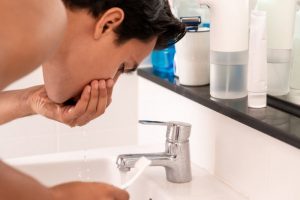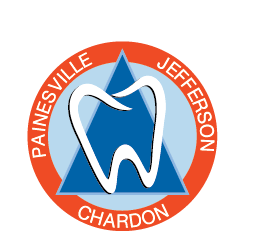
To rinse or not to rinse? That is the question. After you are done brushing your teeth and you spit out the foamy toothpaste, is your dental hygiene regimen finished, or do you rinse your mouth with water? There are people on both sides of the fence regarding this issue. Some folks rinse to get any remainder of toothpaste out of their mouths while others rinse simply because that’s how they were taught as a child. Keep reading to learn from your dentist in Chardon what effect rinsing after brushing has, the risks of not rinsing, plus how flossing and mouthwash factor in.
Why Would You Rinse?
Fluoride helps prevent tooth decay, among other benefits. It’s most helpful when applied directly to teeth for several minutes. But some dental products contain concentrations of this mineral that are higher than what’s recommended for you to ingest each day.
Too much fluoride could cause nausea, diarrhea, or abdominal pain. However, these side effects are usually only an issue when a child ingests a large volume of adult products. It would be very difficult for a healthy adult to reach fluoride toxicity by swallowing a small amount of toothpaste on occasion.
Also, you are liable to have a desire to replace the strong toothpaste flavor in your mouth with something neutral like water, which would leave you inclined to rinse.
The Case for Not Rinsing
Just like the last section began before taking a different turn, fluoride left on your teeth for several minutes is beneficial. To capitalize on that, some experts recommend spitting out any excess saliva or toothpaste after brushing and then avoiding any drinking or eating for at least the next 10 minutes.
You should be just fine following that method. After all, when you partake in a professional fluoride treatment at your dentist’s office, you are getting a higher concentration of fluoride than toothpaste and they suggest you don’t rinse, eat, or drink for at least the next 30 minutes.
How Does Flossing Factor in?
It is recommended you always rinse your mouth with water after flossing to flush out loose bacteria and plaque that might remain. However, moving your flossing step to before you brush could be a simple fix to this issue. A 2018 study on this topic showed that participants who flossed before brushing retained a higher concentration of fluoride after their dental hygiene routine.
When Is the Right Time for Mouthwash?
While certain mouthwash formulas can strengthen tooth enamel and prevent cavities, unlike brushing some healthcare professionals see it as an optional step. If you are going to implement mouthwash after brushing, it should contain fluoride. To play it safe, you may want to wait about 20 minutes after brushing to use an oral rinse, especially if it doesn’t contain fluoride or does have alcohol.
Overall, there’s not a consensus in the dental community about using water for rinsing after brushing. Not rinsing could be beneficial for people who are prone to tooth decay. Rinsing can get the toothpaste taste out of your mouth and prevent too much fluoride from being swallowed. If you need a trusted opinion on the matter, be sure to ask your dentist in Chardon during your next checkup!
About the Practice
At Chardon Smile Center, we welcome patients of all ages who are interested in comfortable care that is well within their budget. Our two dentists each value continuing education courses to stay current in an ever-evolving dental field. If this blog post still has you wondering which way you want to lean in the rinsing debate, we’ll be happy to talk more about the issue during your next dental checkup and cleaning. Schedule one on our website or by calling (440) 286-2474.
